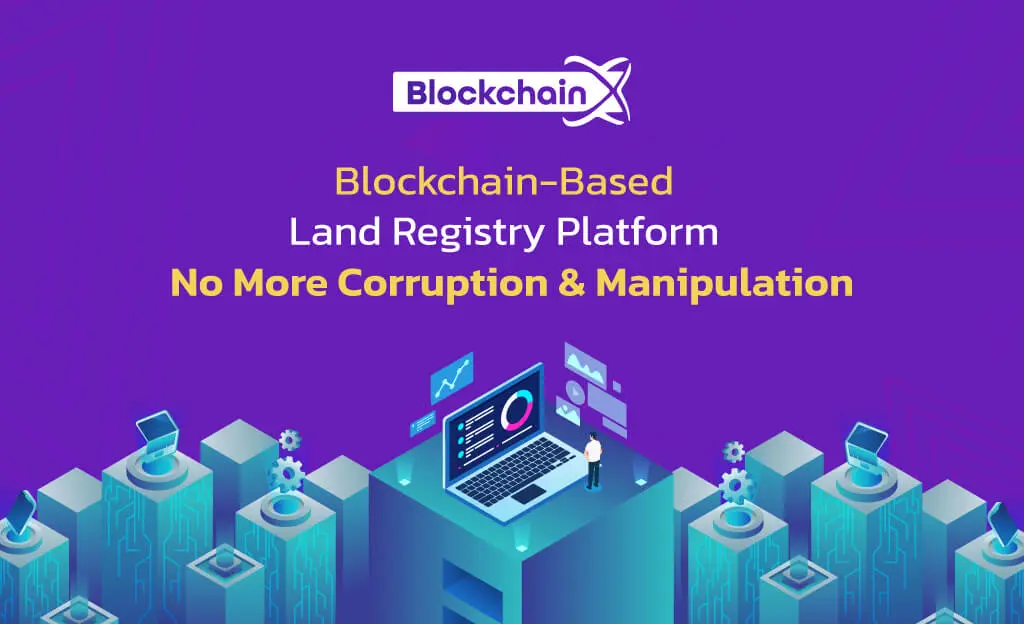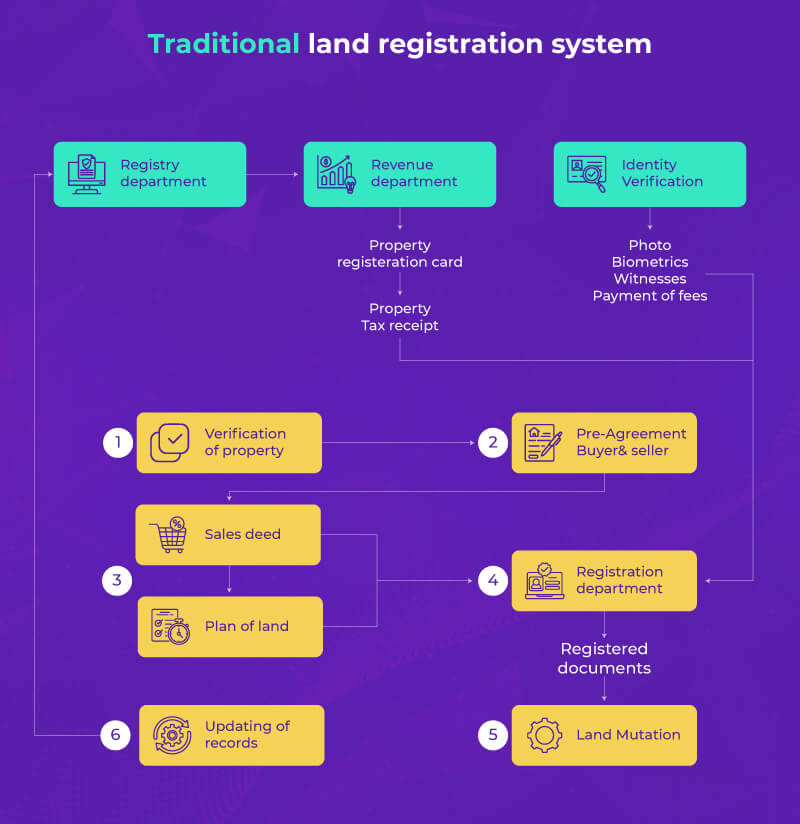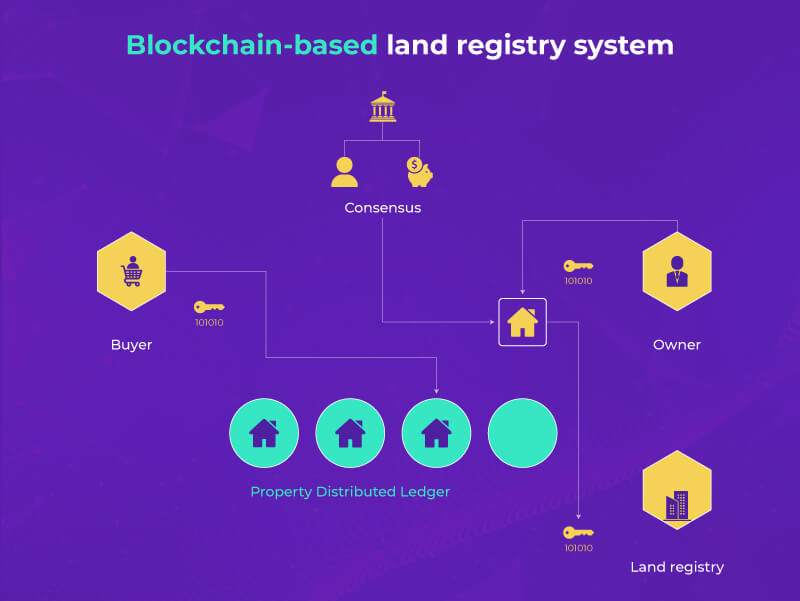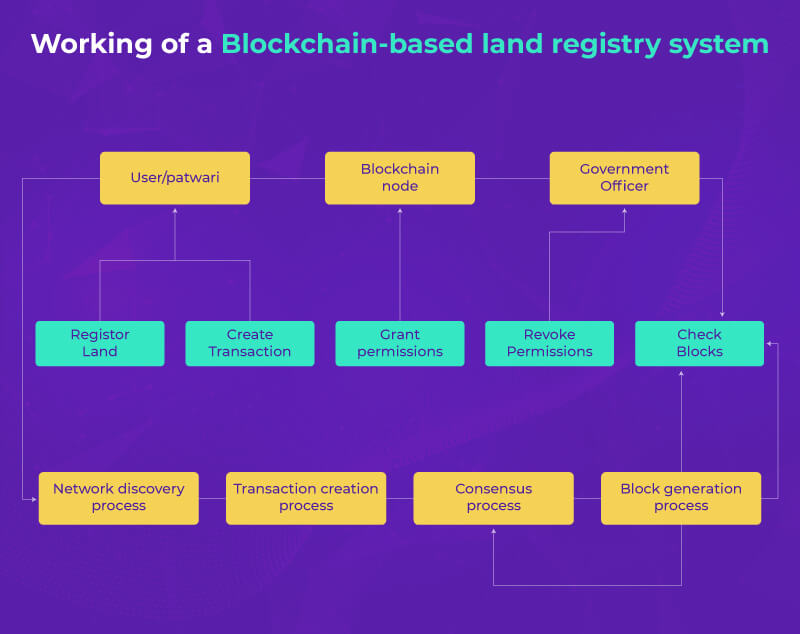Table of Contents


Blockchain-Based Land Registry Platform: No More Corruption & Manipulation
Android's long and strange journey from the initial cupcake to today is a mystery to the world. Similarly, Blockchain started its journey in 2009, created many revolutions, and is still creating and these will continue. Blockchain impacts most of the business sector, be it private or public, and its potential is a great playground or experimental laboratory for explorers to innovate more.
Blockchain has a holistic approach to the land registry process that protects the process properties from corruption or human intervention.
Land registry is one of the use cases where the blockchain technology can improve on the existing options since the process involves many intermediaries to trust.
Blockchain is an ideal remedy to:
Counterfeit titles
Forged documents
Complete loss of records.
Many of us consider land registration a mundane administrative matter, a rubber-stamping task less exciting than getting the keys to a new house.
As monotonous as it may seem, it is essential to ensure a land registration system to avoid corruption and manipulation. A blockchain-based land registry system aims to solve this problem. Everything is made smooth and secure with its immutable, transparent, and auditable nature.
Challenges in the Existing Land Registry System


1. The involvement of intermediaries
Intermediaries and brokers are an integral part of all big businesses as they know more about the market offers. Buyers and sellers usually prefer to call on them to build a full support team. As a result, buyers gain a deeper understanding of the market and identify low/high prices for the transaction. Intermediaries collect necessary information from traders, identify errors, and interpret and facilitate real estate transactions. Because real estate is big business, it involves many players, including brokers, lenders, intermediaries, and local governments. This leads to additional costs, which makes the entire ecosystem expensive.
2. The rapid growth of fraud cases
There are many cases of impersonation as a seller of goods. If a fraudster successfully pretends to be a property owner, they can get the total amount after completion and get away with the funds. In many cases, the partners are not aware of the land registry frauds, and most of the land registries are discovered through land registry spot-check exercises.
3. Time delays in every process
The land registry takes a long time to complete the title registration. There may be a gap of months between completion and registration. Many legal problems can arise during this long gap. For example, if you have to give notice to the landlord to break a lease where the property has been sold. Such problems can delay the whole process and buyers must wait for a long time.
4. Human errors or interventions
Currently, updates to land registry records are made manually, and the accuracy of those changes depends on a particular person. This means that the land registry is more prone to human errors. Human intervention increases the risk of errors in the land registry system.
Blockchain technology can be a solution to all the above challenges.
let's see how.
Why is Blockchain-Based Land Registry System a Right


1. Accelerate and speed ups the process.
Considering the traditional land-registry system, the intermediaries involved hold information that is inaccessible to buyers and may err on the side of providing you with documents such as licenses required to operate in a property transaction ecosystem. Compared to a traditional land registry, a blockchain land registry platform offers you a distributed ledger database where anyone can record and access data. Involvement of any Central Authority. Presently, a property/land title is just a piece of paper.
You have to fill in the blanks in the document, sign it, get it notarized for rubber stamping, and send the documents to the government to transfer the property. The process seems very old and slow. However, creating a digital title using a blockchain land registry platform can improve the process. Using blockchain's possibility to prove authenticity, owners can legally share land ownership with a buyer without any third-party intervention.
2. Cut off the number of fraud cases.
There is no shortage of fraudsters in the real or digital world who are adept at using editing software to create fake documents and falsify ownership. To put an end to such scams, the blockchain land registry platform allows you to attach and upload your title documentation to the blockchain network to protect your document. It can be checked when needed. Blockchain-based land registration allows us to achieve the best features of blockchain, such as immutability, security, and transparency. The immutability of blockchain can prove your ownership of the land and prevent forgery. So, it can be said that the blockchain land registry platform will serve as proof of ownership and transactions.
3. Use smart contracts to bridge transparency.
There are few direct buyers. The process of a loan or mortgage is relatively slow due to administrative issues. But smart contracts can simplify the process by automating verified transactions. The first thing you need to do on a blockchain registry platform is to create an ID, for which you can create a digital, decentralized ID for selling or buying through the blockchain land registry platform.
Doing so will make the transfer of ownership seamless and faster than the traditional method. If the registrar confirms the transfer of ownership of that land, smart contracts update/gives ownership to the new owner or buyer. Then the corresponding transaction will be stored on the blockchain. , it is always possible to trace the history of ownership documents.
In addition to these, blockchain technology will remove middlemen or intermediaries to reduce the hassle of human interaction barriers and reduce manual errors. This will ensure the security and privacy of your documents.
Selecting Blockchain Technology Over the Traditional System
The boom in blockchain technology has become a potential solution to curbing land registry fraud. A secure system of digitized land ownership goes beyond protecting your property rights. It also allows you to borrow against your land assets if you need to raise capital to increase your financial opportunities.
Blockchain-based land registration or property documentation raises the efficiency of the transaction process as well as enhances security. Blockchain's transparent and immutable nature can prevent the forgery of land titles, create and track an immutable history of land transactions, and allow real-time verification of ownership. Blockchain is not a household word like IoT or cloud.
Working Principle of the Blockchain-Based Land Registry Platform


Stakeholders involved in the Blockchain Land Registry Platform are
Seller
Buyer
Land inspector
Let’s see the working principle of a blockchain-based land registration system:
Step 1: User registration
Users can create a profile on the platform using details like name, government-issued ID proofs, and status. Those who want to buy or sell property register on the blockchain land registry platform. A hash for user-submitted identity information is stored on the blocks of the blockchain network.
Step 2: Sellers upload the property
Sellers can upload pictures and documents of properties on the platform and pin the location of the land on the map. The transaction related to the activity of the seller listing the property details is recorded on the blockchain. Once the property details are uploaded to the platform, they will be made available to all users signed up as buyers.
Step 3: Buyers request access
A buyer interested in any specific property can ask the seller to access its details by request. Sellers will receive notifications for property access requests. They can reject or accept the buyer by looking at their profile. The buyer can send a request to view the previous title deeds of the property, purchase it, and initiate the transfer. Transactions related to requests made by sellers and buyers are recorded on the blockchain to ensure authenticity and traceability.
Step 4: Sellers approval and gets the notification
If the seller accepts the request for the transfer of ownership of the land, the Land Inspector will receive a notice to initiate the transfer of the property. Smart contracts enable land inspectors to provide access to land documents. After the land inspector checks the documents, they schedule a meeting with the buyer and seller for the transfer of ownership. The meeting record is also added to the blockchain to settle property conflicts in the future.
Step 5: Land Inspector verifies the transaction and initiates the transfer
The land inspector verifies the documents submitted by the buyers and sellers and adds the authentic documents to the blockchain land registry platform. Both buyers and sellers sign the property ownership transfer deed at the land registry platform in front of the land inspector. The signed document is saved in the database, and the transaction associated with it is recorded in the blockchain. The transfer is initiated, and smart contracts are sent to the seller and ownership of the title to the new buyer.
Step 6: Document Validation and Authenticity
In case of any disputes, any authorized party can verify the authenticity and validate the signed land registry document by uploading it on the platform. If the hash generated after uploading the document is the same as the hash generated at the time of signing the document, then the document is authentic, and no changes have been made to the document.
Wrapping Up
Land registry is a hassle where many intermediaries are involved in the transaction process. Existing solutions are outdated when you have thousands of land records and tracking which property belongs to whom is challenging. The transparent nature of blockchain makes it possible to trace how assets are transferred.
Blockchain technology allows for fast, peer-to-peer transactions with software-guaranteed automatic protection. Hence, the life of the land owner is made easy by the seamless implementation of a blockchain-based land registry system. Learn more before investing, are you curious about what and how blockchain is? Then you get a deeper insight into how every transaction is time-stamped, irrefutable, and untraceable.





